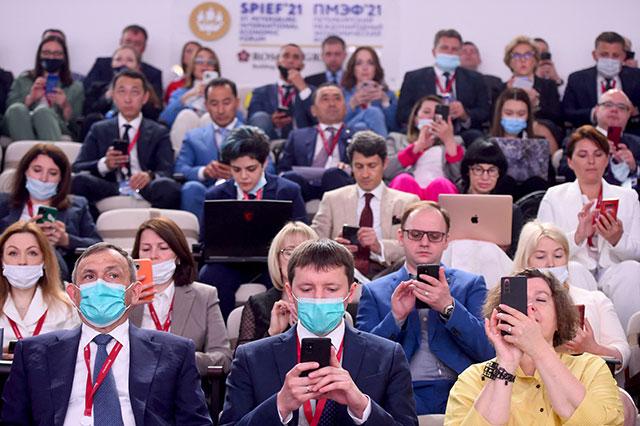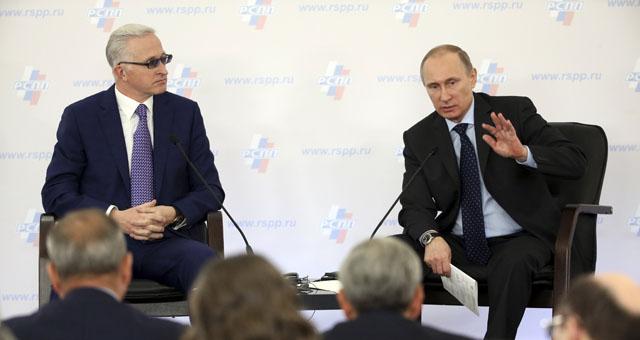You are here
Delicate dance for businesses at Russia economic meeting
By AFP - May 24,2018 - Last updated at May 24,2018

Japan’s Prime Minister Shinzo Abe gets into a car at an airport as he arrives to attend the St Petersburg International Economic Forum in Russia on Thursday (Reuters photo)
SAINT PETERSBURG — Amid sanctions, countersanctions and trade wars, Western firms gathered at the Saint Petersburg economic forum that kicked off Thursday will need to tread nimbly with a Russia keen to attract foreign investment.
The annual event, often called the Russian Davos, used to serve as a window on a booming economy, but over the past five years has been a soap box allowing the Kremlin to let the world know it is open to investors despite tense relations with the West.
This year, French President Emmanuel Macron and Japanese Prime Minister Shinzo Abe will make an appearance at the three-day event.
This year’s forum comes at a critical moment for Russia, which is just overcoming a recession triggered by US sanctions and a drop in oil prices in 2014.
Putin, who was re-elected in March, has put the development of the economy at the heart his fourth term in office, and aims to catapult the nation into the fifth-largest economy spot, from its current position in 12th place.
Russia will need to boost its growth rate to six per cent from year, from the lethargic 1.1 per cent it registered last year, to meet that goal, former finance minister Alexei Kudrin said on Thursday.
Tens of billions of dollars in investment will be needed, and despite rising oil prices Russia will not be able to muster that without foreign firms and investors.
The head of Russia’s central bank, Elvira Nabiullina, said “direct investments should become one of the main sources of Russian growth” and that the country would need to increase its transparency to attract foreign capital.
International Monetary Fund (IMF) Chief Christine Lagarde praised Russia for its stable finances and low inflation.
But she noted the rapid growth it had previously enjoyed was gone and that according to the IMF’s estimates was growing at a rate of 1.5 to 1.7 per cent.
Lagarde said the low growth was not only due to foreign sanctions or low oil prices, but Russia’s falling population, which means it needs to implement reforms to boost productivity.
During the discussion Finance Minister Anton Siluanov announced that the government would create a fund to spend up to 3 per cent of annual economic into public infrastructure in an effort to boost growth.
Open for business
Russia’s hopes to attract foreign firms and investment have been received a cold shower from the latest US sanctions, and the Kremlin’s promises are viewed somewhat sceptically as Putin has several times set the goal of becoming a top five economy during his 18 years in power.
Moreover, Putin kept in place his team in the new government appointed after the election, dashing hopes for the appointment of reformers.
“There is clear caution, even reluctance to get involved from the British, the Americans,” said Charles Robertson, an analyst at Renaissance Capital, although he noted there many French firms at the forum due to Macron’s presence.
He also downplayed Russia’s growth rate, saying it is better than it appears on the surface as the declining population means it is a bigger gain in per capita terms.
With wages now lower than in China and a highly-educated workforce, Robertson said Russia would remain attractive to many firms.
Despite the strained international situation, the Saint Petersburg forum has still attracted more than 1,400 foreign companies from 70 countries.
Even if most US multinationals are staying away, others are showing their commitment to a nation of more than 140 million people into which foreign firms have poured billions in investment since the collapse of the Soviet Union in 1991.
The chief executives of US aircraft maker Boeing, as well as the oil companies BP, Shell and Total are also attending.
Macron is also expected to send the message that not only political dialogue should continue, but business ties as well within the framework of sanctions.
“So far Putin and his team have been clear, they want to be as open [as] the world will allow them...” Robertson told AFP.
Related Articles
SAINT PETERSBURG — A flagship economic forum has returned to Saint Petersburg, with Russia aiming to signal it has moved beyond the coronavi
SAINT PETERSBURG — President Vladimir Putin on Wednesday opened what has been billed as Russia’s first modern motorway, almost halving the d
President Vladimir Putin told company bosses on Thursday to bring their assets home and clean up their businesses to help Russia survive Western sanctions over Crimea, and an economic downturn.



















